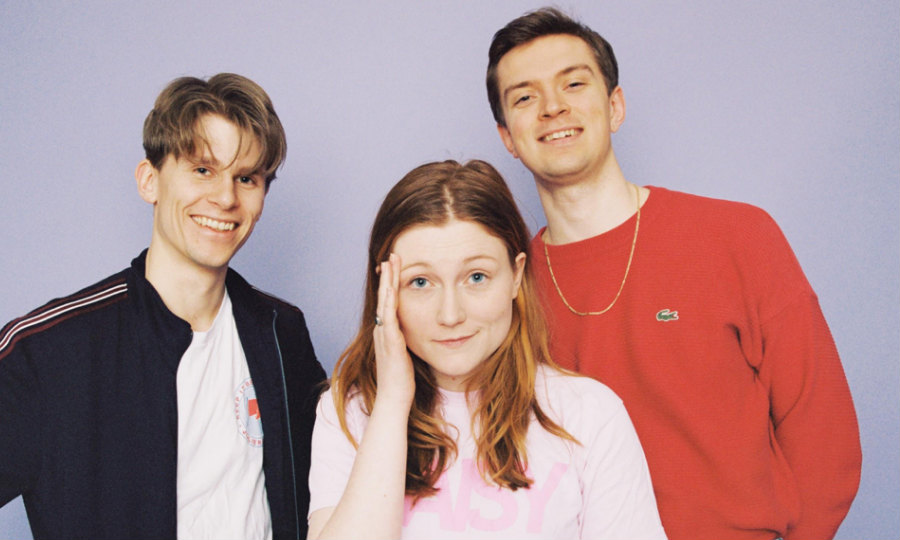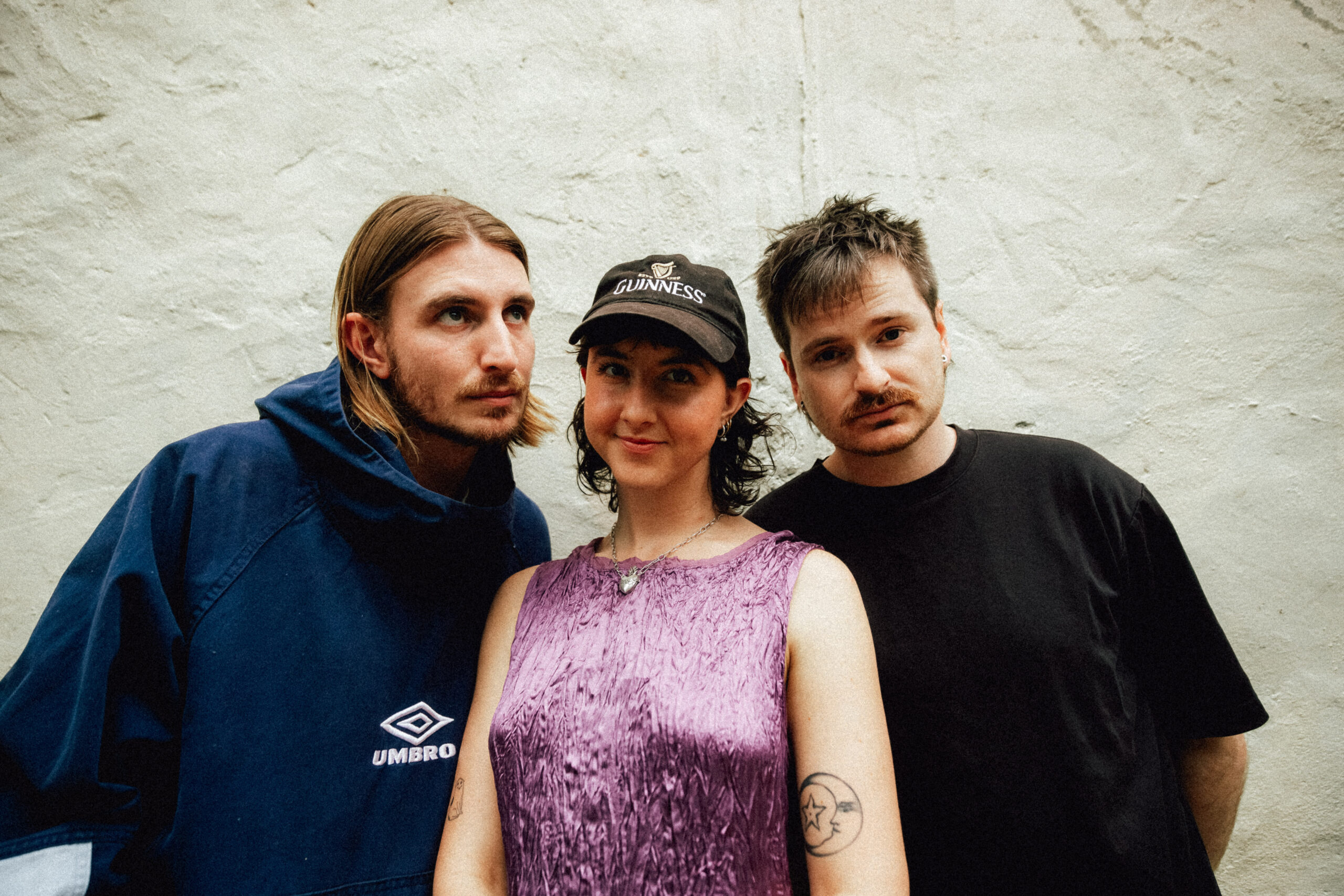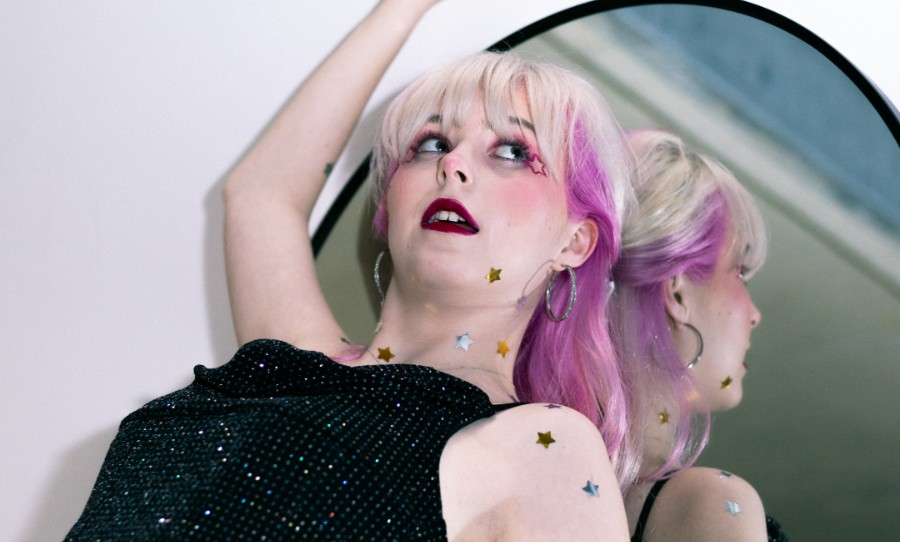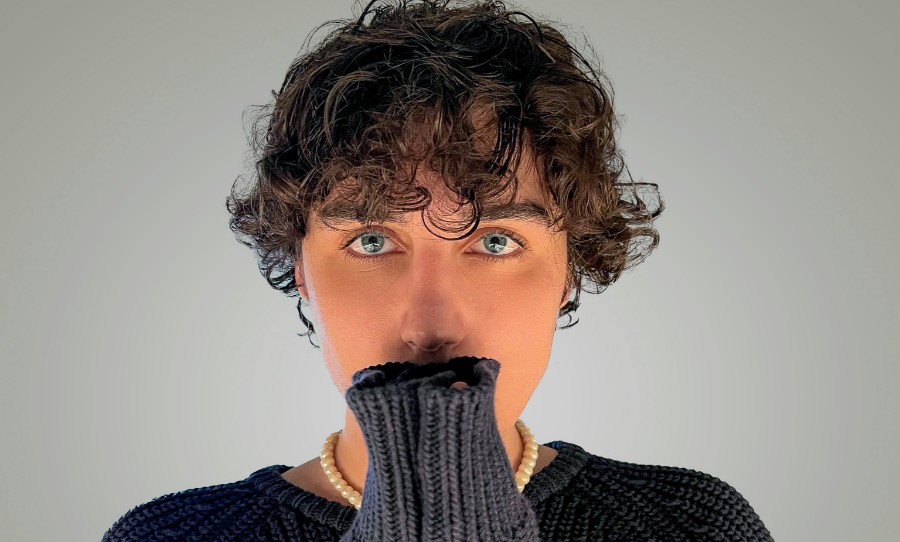Oslo natives Sløtface have just released their second album and are poised for world domination. Before they embark on a European we caught up with frontwoman, Haley Shea, for a chat.
Sløtface are a band that demand attention. From their name – previously spelt and still pronounced Slutface – to their nuanced messages of a warming planet and women’s rights, Haley Shea shies away from no one.
Their second album delivers more punch, more punk, and more personality than ever before. We caught up with frontwoman, Haley Shea to get the low down on exactly how they went about making the album, as well as themes of mortality, darkness, and working with producer Odd Martin Skålnes.
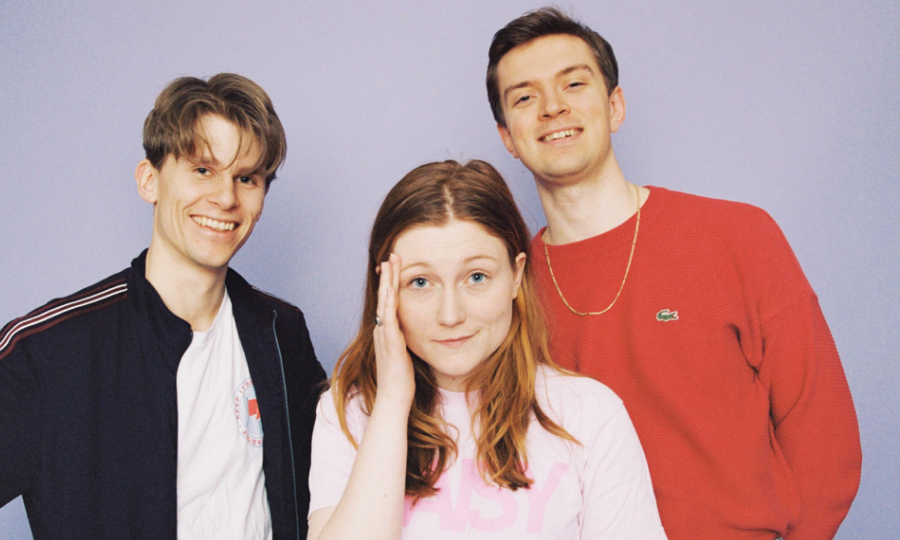
HAPPY: Congrats on the album! I especially love Tap The Pack. I love the story of your grandfather carrying around a pack of cigarettes in his breast pocket after he quit. Why do you think he put himself through that?
HALEY: I just think he was kind of a badass. So he just wanted to prove to himself that he could. Even though the temptation was there he didn’t have to indulge it.
HAPPY: Cause that would make quitting three times hard I imagine.
HALEY: I was visiting my grandmother this Christmas and she said he used to get so frustrated he would have to run up and down the driveway so he wouldn’t give in.
HAPPY: Do you have a sort of packet for yourself?
HALEY: Not really. I kinda have an obsession with doing things just because they are difficult. I don’t know if that’s always the healthiest way to treat life so maybe I’m going in a little bit of an opposite direction.
HAPPY: I really like the lyric, “Thought I tasted success and I clamped it in my teeth. But at some point I must have lost it, Jaws’ exhausted.” It reminded me of something Thom Yorke said about champing at the bit for fame. Do you think the relentless drive for success and perfection is crucial to achieving fame?
HALEY: Maybe, it seems these days you have to work really hard to stay in the spotlight long enough, to keep people interested. It’s not just one interesting thing you have to give people constant drips so that they don’t forget you. That’s kind of speaking for them though, a lot of us try no to think about that stuff.
HAPPY: Your forthcoming album, Sorry For The Late Reply, is inspired by experiences growing up in Norway with American parents. What sort of delineations did you face being drawn to two different cultures?
HALEY: For me, it was a lot of feeling like I’m in between. Wondering where you belong and what it means to be home is a lot of what this album is about. A lot of, ‘Where do you belong’. We tried to write about it in an honest and nuanced way rather than a black and white way.
HAPPY: So if you just woke up to I’ll try not hit you with too many philosophical questions.
HALEY: I can feel that my brain has to work a little harder than usual but I’ll try my best.
HAPPY: How is Oslo looking this morning?
HALEY: It’s still pitch black for a couple of hours. So, even though it’s 7 am here it’ll still be dark for a while.
HAPPY: That’s really interesting. Do you ever write music in the morning when it’s dark? Or do you find the light of day more inspiring… you get more creative when the sun comes up?
HALEY: Oh, I usually write right before I go to bed. I talked to a lot of writers in the same way where you get all your good ideas like right as you’re about to fall asleep, so I guess that happens in the morning as well.
HAPPY: Why do you think it is that people become creative right before they fall asleep?
HALEY: Your brain is relaxing its processes, all the connections that it’s been trying to make sort of shut off right before you go to bed so your head is clearest.
HAPPY: When you guys were touring your debut album, you played in a few Norwegian prisons. What was running through your head when you were playing those shows?
HALEY: So we played a few government prisons. They were mostly high school students receiving high school education, but also a lot who are going to be in prison for a long time. I think we just really tried to treat every day it’s an opportunity to meet a bunch of people, and treat everybody with respect. Say hello to everybody and just treat it like any other gig, kind of.
HAPPY: Was the crowd starkly different to one in a typical club?
HALEY: It was an incredibly attentive group of people to play too because they don’t have the same access to entertainment as other people that would normally buy a ticket to go see a show. Everybody we talked to was really, really grateful, especially for playing rock music and not trying to quiet it down.
HAPPY: Were people dancing?
HALEY: No, they weren’t allowed to stand.
Check out a killer single from Sløtface’s debut album below:
HAPPY: When you were mapping out your new album, you created this big map on your wall with notes and themes and quotes from books and films, and I pictured a wall you might see in a crime show when they’re investigating some murder. Was there a beautiful madness to this process?
HALEY: I think that’s how I initially pictured it. I wanted to become obsessed with it and watch it just keep growing and growing. I mostly did it because it was the wall face opposite from my bed. I would see it every morning before I went to do things and every night before I went to bed, and I thought that would force me to be thinking about things a lot of the day. But I quite quickly realized, the more it’s in front of you the easier you get used to it. So it stopped growing after a while. At one point, it almost became more annoying because I was constantly having to look at it even though I wasn’t working on it. Then I left that way of working a few months in and just went back to the way I usually work, which is writing in notebooks. Plus, this time I tried writing, in one sentence, what each song is about rather than coming up with something halfway through which was really helpful.
HAPPY: In New Year New Me you talk about the fallacy of resolutions and trying to be better every year. Why do we lie to ourselves like this?
HALEY: Everybody just wants to be better. I feel like whenever I come back for a new year I’ve had a little bit of a break. And that’s when I start to think about things because most of the time you’re kind of just trying to make it through the week or the day. But when you have a little bit of a break, you start to think about how you can be better and you could be doing things differently. But in the New Year, it’s harder to keep those things up than to think about them.
HAPPY: On the new album you are working with Producer Odd Martin Skålnes, who has also worked with Aurora and Sigrid. What new techniques has he brought to the table?
HALEY: Well, usually we work with producers who are used to bands. I think the biggest difference working with Odd Martin is that he was much more used to working in a pop session way, with one person at a time. Which was kind of interesting because he still knows how to be diplomatic and talk to a group and do that teamwork thing, which is quite important if you write together as a band. But he also has a really good approach to laser focus on each member. I think he’s really good at making everybody feel seen and heard, and everybody’s ideas feel valued when you work with him which is really nice. But he’s also been working on lots of pop stuff lately, so it was really fun to borrow his pop ear for a bit.
HAPPY: That’s really interesting, him being a pop producer and you expressing wanting to create a more minimalistic and rawer sound on this record. Why did you feel compelled to strip things back?
HALEY: A lot of it has to do with us playing live. For the first record we toured a lot. And I think for this one, we wanted to make it even easier to recreate it live. So it will make our job easier when we go back on the road and play it. Because the whole live thing is the most important thing to us and we are always working towards making that the best experience possible. Also, we just wanted to make things clearer and to have a little bit more space between all the riffs, bass lines, and lyrics. We wanted everything to just be clearer.
HAPPY: And I noticed on a lot of your art people have their eyes scribbled over, is there any conceptual thinking behind that?
HALEY: When we were working on artwork designs, we had a lot of like or movie references, especially The Texas Chainsaw Massacre kept coming up. Plus, we knew we wanted to use family photos because of the themes on the record. But then we thought it would add a kind of creepy element to proceedings. And there’s a lot of stuff about death on this record, a lot about going to people’s funerals, so I felt like the whole brightly coloured scribbles and the family photos would be both happy and creepy at the same time.
HAPPY: Yeah, it’s quite strange to see these intimate family photos with the eyes crossed out. It takes such a human element out of it.
HALEY: Yep, we also thought that would help to dehumanize it. On the vinyl all the eyes are normal on the inside as it folds open. So it’s kind of like you’re opening up to what people are thinking inside, it was a very conscious decision.
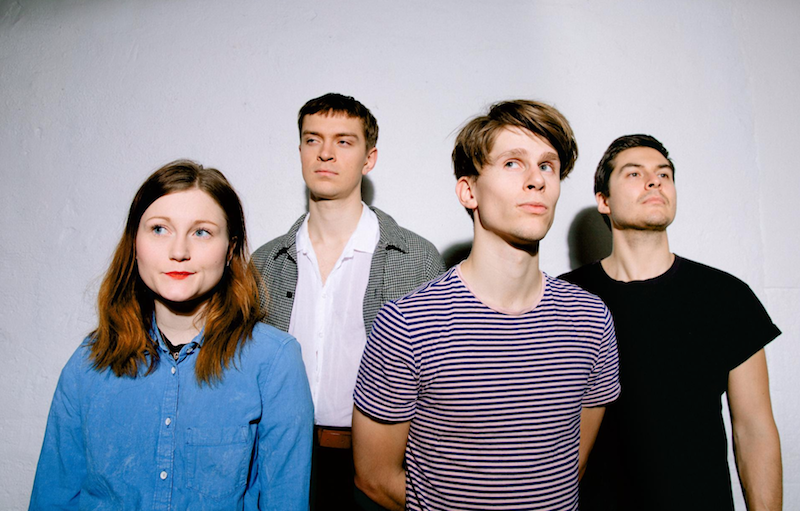
HAPPY: As you said, you confront lots of themes of death on the new album, and on tracks like SUCCESS you tackle themes global politics and disenfranchisement. What has brought these new themes into your consciousness as a writer?
HALEY: Well we talked after the first record and was thinking a lot about how we wanted to bring even more of the political side of us as a band into the music. It was something we spent a lot of time doing in other parts of our lives and in music videos and activism. So I guess we wanted to put more of our politics into the lyrics for this record. And the best way I could think to do that would be just to try to be as specific as possible and tell stories that were really specific and personal, but also kind of showcase our political opinions. That’s why we decided we wanted to write things that were very connected to humanity, like climate change, or like international politics, shine through. I think the worst thing that we didn’t want to do was to be preachy and try to force our opinions on other people. The main point of it is to be sort of nuanced and to show things from different sides.
HAPPY: And the new album drops in two days, I believe, how are you feeling now that it’s out of your hands.
HALEY: I think the release cycle finished a while ago, which every band does. Then it lives its own life for a while and other people work on it. Then everybody gets together to put it out in the world together. Having it become part of people’s lives is the goal. I mean, that’s always the goal is to have people find something in some of the songs that they can really relate to that means something to them. It’ll be nice to have it out there and to have people talking about it. We have also lowered our expectations a lot. On the first record, it was like “Okay, this is it, this is gonna be the moment everything changes.” This time around I think we cared more about a record than anyone could, which is a good thing. But we have reasonable expectations about other people’s reaction to it.
HAPPY: Do you have any particular tracks on the album that are speaking to you at the moment?
HALEY: Well the song Static is about living in the dark so that’s pretty relevant to me right now. I’m very focused on the darkness outside and January in Norway is usually very long and I’m always ready for it to be over.
HAPPY: I’ll just wrap up by asking what’s up next for you guys? What’s the plan for the next year?
HALEY: We are going to do our first Norwegian club dates in a long time over the next couple of weeks, which we’re really excited about. We actually had a listening party in Oslo last night for the record, where we worked the bar and played a few songs, which was cool. And we’re going to do something similar on Thursday in another Norwegian city. Then we go on tour in Europe. I guess the live side of things is the focus now. So we’re getting ready for these shows by like practising a lot, working with our lighting and sound engineers. It’s a good time to be in a band.
HAPPY: Amazing. Sounds exciting.
HALEY: Thank you, thank you.
